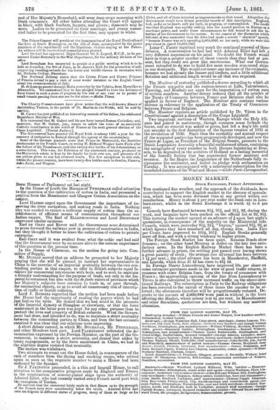POSTSCRIPT.
Barn Houses of Parliament sat last night.
la the House of Lords the Marquis of To MALE called attention to the question of the cultivation of cotton tie India, and presented a petition from the Manchester and Glasgow Cotton Association on the sohject. Lord HARRIS urged upon the Government the importance of im- proving the river navigation, and making roads in India. Nothing else was needed to ensure a sufficient supply of eotton than the es- tablishment of efficient means of communication throughout our Indian empire. The Earl of FaaincEOROSGII and Lord BROUGHAM EEarlsimilar opinions. Earl DE GB.EY and RIPON said the Government were determined to press forward the railways now in process of construction in India, but they thought it better to leave the cultivation of cotton to private enterprise.
Earl Gasr said it was evident from what the noble earl had said that the Government were by no means alive to the serious importance of this question at the present time. In the House of Commons, on the motion for going into Com- mittee of Supply,
Mr. DUNLOP moved that an address be presented to her Majesty praying that she will be pleased to instruct her representative in China in the exercise of an impartial neutrality between the two con- tending parties in that empire, to offer to British subjects equal fa- cilities for commercial intercourse with both, and to seek to maintain a friendly understanding for the purpose of trade, not only in the lin- penal Government but also with the de facto rulers of provinces which her Majesty's subjects have occasion to trade in, or pass through, for commercial objects, so as to avoid all unnecessary risk of interrup- tion of traffic or hostile collision.
Lord J. RUSSELL regretted that the motion had been made before the House had the opportunity of readinr, the papers which he had just laid on the table. He denied that we had acted in the interests of the Imperial dynasty at Shanghae or elsewhere, or that the force maintained in the latter port was kept for any other purpose than to protect the lives and property of British subjects. What the Govern- ment had done, and intended to do, was to maintain a strict neutrality between the contending parties in China, and from the last accounts received it was clear that our relations were improving. A short debate ensued, in which Mr. BUCHANAN, Mr. FITZGERALD, and other Members took part. Lord PALMERSTON reiterated the de- termination expressed by the Foreign Minister, on the part of the Go- vernment, to maintain a strict neutrality, and denied that either by treaty engagements, or by the force maintained in China, we had in -the slightest degree violated that neutrality.
The motion was withdrawn.
Two attempts to count out the House failed, in consequence of the rash of members from the dining and smoking rooms, who retired again as soon as the requisite number to make a House had been reckoned by the Speaker.
Sir J. PAKDIGTON proceeded, in a thin and languid House, to call attention to the comparative progress made by England and France in the construction of armour-plated ships upon the authority of Admiral Elliot, who had recently visited every French naval port with the exception of Toulon. He asserted that the statement lately made in that House as to the strength of the Freuch navy were considerably below the truth. Admiral Elliot had seen ten frigates in different states of progress, many of them as large as La. Gloire, and all of them intended as improvements on that vessel. Altogether the Government would have fifteen powerful vessels of this description. England, had, as far as he knew, only six built, in progress, or contemplated. The result was that ...England was rapidly sinking into the s=ond position in Europe as a maritime power, and under these circumstances he felt bound to ask the in- tention of the Government in the matter. In the course of the discussion which followed, it was contended that Sir John had made a merely " alarmist" speech, " because France was only spending 6,000,000/. on her navy, while we were this year about to spend 12,000,000/. Loan C. PAGET regretted very much the continual renewal of these debates. A. conversation he had had with Admiral Elliot had left a very different impression on his mind. No doubt the French would have in times greater number of these vessels than they had at pre- sent, but they could not grow like mushrooms. What our Govern- ment intended to do was to build five more wooden iron-cased ships Utt our dockyards. This wouldnot cause any increase of the estimates, because we had already the frames and timbers, and a little additional flotation and additional length would be all that was required.






























 Previous page
Previous page